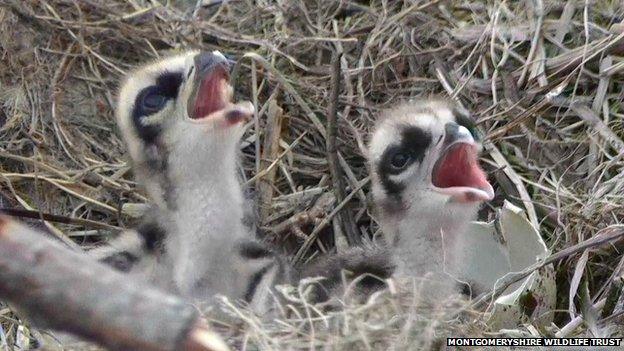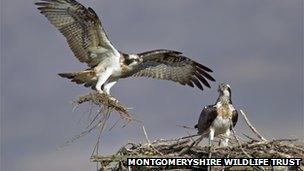Two osprey chicks hatch in Dyfi Valley
- Published

Better late than never: Two chicks hatched at the Cors Dyfi reserve on Friday and Sunday
Two osprey chicks have hatched at a nature reserve in Powys despite fears their parents had paired up too late in the mating season.
The first bird emerged at the Cors Dyfi reserve near Machynlleth on Friday, followed by a second on Sunday.
The eggs were laid six weeks later than usual leading to concerns over whether the chicks would hatch.
Parents Monty and Glesni set up home on a 30ft (9m) tall man-made nest on 3 May.
They are one of only two known breeding pairs in Wales, with a second pair nesting near Croesor in the Glaslyn Valley.
Staff and volunteers at the Cors Dyfi nature reserve had an anxious wait for the chicks who took 32 hours to emerge from their shells.
Cracks in the first egg were spotted on Friday afternoon, with the bird finally hatching at about 21:00 BST.
The second chick started chipping away from inside its egg on Saturday afternoon but did not hatch until 20:40 BST on Sunday.
Monty and Glesni became a breeding pair for the first time this year after Monty's previous partner of two years, Nora, did not return from her African migration.
Ospreys return from migration in late March or April and usually lay eggs two or three weeks later.
But Monty and Glesni did not pair until 3 May and their two eggs were laid between 22 and 25 May - six weeks later than average.

Monty and Glesni did not pair up until 3 May
Alwyn Evans, of Montgomeryshire Wildlife Trust, said: "By the time Monty finally paired off with his new partner, Glesni, a three-year-old bird from Rutland Water, it was getting late in the season.
"At that stage none of us knew if they would lay eggs, let alone whether they would hatch.
"It's been an emotional weekend to say the least."
Hunting
Mr Evans said cracks in the second egg on Saturday were greeted with loud applause and shouting from visitors at the wildlife trust's osprey centre who had gathered to watch the birds hatch.
Last month the wildlife trust said ospreys were still persecuted and egg collecting remained a problem in the UK.
To protect the Powys eggs, more than 50 trust volunteers have worked 1,300 hours to ensure the nest has been watched 24 hours a day during the six-week incubation period.
The first osprey chick in the Dyfi valley for 400 years hatched in 2011.
Once prolific birds of prey in the UK, their numbers were drastically reduced in the 1840s after years of persecution, including egg collecting, hunting, taxidermy and loss of habitat.
The Dyfi Osprey Project has been popular with tourists, with an average of about 30,000 people visiting the nesting site annually.
- Published17 June 2013
- Published16 April 2013
- Published31 May 2012
- Published2 March 2012
- Published25 July 2011
- Published6 June 2011